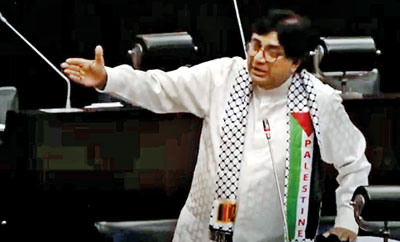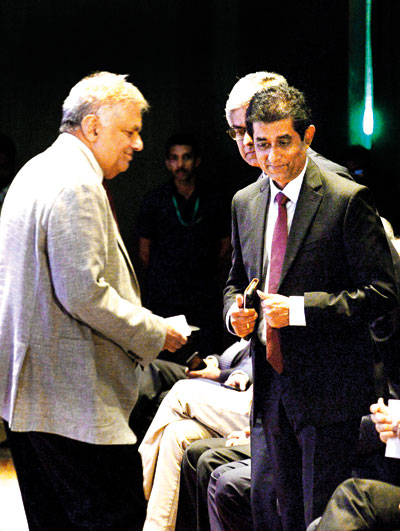Speakers and Deputy Speakers bald out because of brawls
View(s): 382
The normally affable Deputy Speaker Ajith Rajapakshe was a frustrated man yesterday as he reacted angrily after being interrupted when speaking in Parliament.
Mr. Rajapakshe, who chaired the special committee appointed by Speaker Mahinda Yapa Abeywardena to probe the brawl that took place in Parliament’s lobby on October 20, was making a point on the floor of the House when he was interrupted by angry exchanges between the two sides. “Some people expect the Chair to behave like Hitler, while others think he is some sort of all-powerful being. But we know how stressful the role of the Chair is, as he comes under immense pressure from many MPs at once. It’s tough to handle that stress, though some people seem to think it’s easy,” a clearly angered Deputy Speaker told the Speaker.
The Deputy Speaker then spoke of a recent experience he had when taking part in a study tour in South Korea. An African country’s deputy speaker, who was seated next to him, pointed out to Mr. Rajapakshe that he was going bald. “She told me that in many Parliaments around the world, Speakers and Deputy Speakers are bald because the stress they undergo has made them lose their hair quickly,” said the Deputy Speaker, sparking loud laughter from both sides of the aisle.
Amid laughter from MPs, Speaker Mahinda Yapa Abeywardena, who is fully bald, felt compelled to step in. “As for me, baldness has been present in my family for generations,” said the Speaker, prompting even more laughter.
Holding Bible in handcuffed hands, self-styled prophet remanded
When the self-styled “prophet” Jerome Fernando appeared before the Criminal Investigation Department (CID) on Thursday following his return home on the previous day, he would not have expected to be arrested since it was more than six months after he left the country following his controversial remarks on other religions.
The CID recorded an eight-hour-long statement from him on Thursday and told him to come on the following day to continue with the questioning. Eventually, he was arrested on Friday and remanded until December 13 after being produced in Colombo Fort Magistrate’s Court.
What caught the attention of many when he was led to the prison bus after being produced before court was what he was holding in his hands with handcuffs. It was a Bible from his own church. With police officers accompanying him, he was heard saying, “See you later!” as he boarded the prison bus.
Shawl-wearing Dilan tells Govt. to sever ties with Israel
With the Gaza war flaring again, taking a strong position against Israel was Sri Lanka Podujana Peramuna dissident Parliamentarian Dilan Perera.
On Wednesday, addressing a public event to mark the United Nations Day of Solidarity with Palestine, he called on the government to sever relations with Israel if it did not stop its massacres in the Gaza Strip.

Parliamentarian Dilan Perera: Powerful voice for the Palestinian cause
Pointing to the Palestinian shawl he was wearing at the event, the MP said he would continue to wear the shawl for three days in Parliament. True to his word, he was seen wearing the Palestinian shawl in Parliament.
On Friday, addressing the committee stage debate on the Trade and Industry Ministry vote, he questioned the morality of the government’s decision to send 10,000 workers to work in Israeli farms.
“A lot of people asked me why I’m wearing this shawl. Today, thousands of women and children are being killed in Gaza. Hospitals and refugee camps are being bombed. As a country and as a Parliament, I think it’s high time that we looked at our relationship with Israel, at least temporarily,” he told the House. “Why are we sending our workers to Israel when Israelis are killing Palestinian workers there?” queried the MP.
Mr. Perera asked the government to renegotiate the Memorandum of Understanding (MoU) between Sri Lanka and Israel on sending workers to Israel “at least until Israel stops the war.”
The MP noted there is a precedent for Sri Lanka acting against Israeli aggression, pointing out that former Prime Minister Sirimavo Bandaranaike once severed all ties with Israel. So many countries around the world have done so in recent weeks owing to Israel’s devastating offensive in the Gaza Strip, said the MP. “We should not look at this as a Muslim issue but as a humanitarian issue,” he insisted.
Several other MPs have been wearing Palestinian shawls this week in solidarity with the people of Palestine. They include Sri Lanka Muslim Congress (SLMC) Leader Rauff Hakeem, SLMC MP Ali Zahir Moulana and SJB MP Imthiaz Bakeer Markar.
PM cuts expenditure by 46%; tells others to take the example
Prime Minister Dinesh Gunawardena dropped in for a brief chat with Parliament journalists during lunch on Tuesday, when the expenditure of his Ministry of Public Administration, Home Affairs, Provincial Councils and Local Government was being debated. His state ministers, Janaka Wakkumbura and Ashoka Priyantha, and Parliamentarian Yadamini Gunawardena were also present.
A talking point during the discussion was the fact that the PM’s Office had been able to reduce its expenditure by as much as 46 percent this year compared to last year. “The problem is that ministries, departments, and other government institutions think they should spend all the funds allocated to them for that year,” Mr. Gunawardena said. “If we look at the expenditure of these institutions during the last three months of the year, we will see a massive spike. That is them scrambling to spend the funds allocated to them,” he said, noting that a lot of it was wasteful spending.
By saving 46 percent of its expenditure and returning it to the Treasury, the PM said his office had set an example that hopefully other institutions would take note of and follow. “We have shown that it could and should be done. It is up to them to follow that example,” he said.
The PM also told journalists that he was confident that the country would soon come out of bankruptcy with the release of the second tranche from the International Monetary Fund (IMF) and the completion of debt restructuring.

President Ranil Wickremesinghe at the Sri Lanka Economic Summit 2023. With him is Ceylon Chamber of Commerce Chairman Duminda Hulangamuwa
President’s quotable quotes on taxes and ‘red light’ tourism
President Ranil Wickremesinghe is quite well known for his quips and witty answers to change the mood of the discussion in a serious meeting or counter tough questions in a hard-hitting interview. Often, he is criticised in Parliament, too, for downplaying issues that are under critical debate. However, this was evident from the two engagements he had this week and how he tackled them.
He took part as chief guest in the Sri Lanka Economic Summit 2023, organised by the Ceylon Chamber of Commerce, on Thursday at the Shangri-La Hotel. Montek Singh Ahluwalia, Deputy Chairman of the Planning Commission of India from 2004 to 2014, also participated in the inauguration and gave a keynote address followed by a discussion.
During the panel discussion, the much-talked-about topic among Sri Lankans these days, taxes, came up, as did how the government was planning to meet the budget deficit with more tax reforms under the pipeline.
In his response, President Wickremesinghe put it subtly to recall that it was the Ceylon Chamber of Commerce that welcomed the tax cuts introduced by the previous regime. “Though former President Gotabaya Rajapaksa is being blamed for reducing taxes, all of you guys agreed to it,” he said, indicating the chair and fellow members of the organisation who were
at the event.
A bit embarrassed by the unexpected comment from the President, CCC Chairman Duminda Hulangamuwa said, “I didn’t expect that answer anyway,” while sharing a good laugh with the audience.
In a separate event, addressing the 58th Annual General Meeting of the Hotels Association of Sri Lanka (THASL), President Wickremesinghe outlined the need to develop the tourism sector while keeping up with regional markets like Vietnam and Singapore and promoting our rare cultural identities and cuisine.
Stressing that tourism was not something new for Sri Lanka and even existed during the Anuradhapura period in the country, he said there were “red light” districts in the region targeting seafarers passing through the island.
“When you came by ship during one monsoon, you couldn’t go back till another monsoon passed. So what do you do in between? In their own way, they worked out what tourism would be. I am not advocating for that at all. If I do that a whole lot of people will be picketing outside my office tomorrow, but I am giving you an idea of how they did it,” he said.
